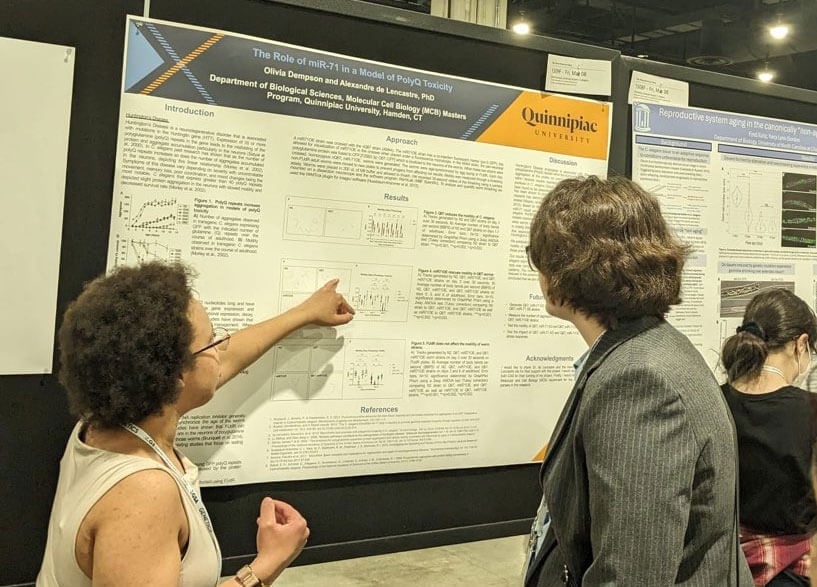
Graduate student presents game-changing genetic research at the Allied Genetics Conference
April 09, 2024

April 09, 2024

Dempson’s research, "The role of microRNA-71 in a model of polyQ toxicity", was inspired by a mix of her curiosity and the research focus of her professor, Alexandre de Lencastre, professor of biology and director of the graduate program in molecular and cell biology, whose lab studies the role of microRNAs in neurodegeneration in the roundworm C. elegans.
“I have always been fascinated with understanding human diseases and how to treat them, which is exactly what I am currently studying in the lab,” said Dempson, a student in the molecular and cell biology program.
Dempson's research is focused on PolyQ toxicity, a primary contributor to Huntington’s disease, and finding ways to mitigate the harmful effects of this mutation according to Dempson.
“This disease is characterized by the expression of 35 or more polyglutamine (polyQ) repeats, leading to the misfolding of the Huntingtin protein and the accumulation of aggregates in the neurons,” says Dempson. “This can result in uncontrollable movement, memory loss, poor coordination, mood changes, and other symptoms.”
Dempson said she hopes that her research contributes largely to the field of genetics and biological research, as one of her driving reasons to partake in research is to contribute to the future of therapeutics and genetics.
“Currently, there are no effective therapies available for diseases like Huntington's or Alzheimer's. This means that every day individuals suffer from these diseases, and families have to watch their loved ones experience the struggles that come with them,” Dempson explained.
“Understanding how to manipulate or suppress these diseases using techniques such as microRNA can make a significant difference. One of the great things about research is that publishing this kind of work leads to more questions and further research, resulting in even more significant outcomes. Even the smallest questions can lead to breakthroughs that can change lives,” said Dempson.
The opportunity came to fruition during Dempson’s January break when she was working in the lab with de Lencastre.
“Dr. de Lencastre thought it would be a fantastic chance for me to present my research and also learn about other research projects happening both nationally and internationally,” said Dempson.
Dempson explains the honor she felt having her professor recommend her for this opportunity.
“Having my professor suggest that I present my research at such a big conference felt incredible and honored in a way,” she said. “These conferences aren’t small in any manner, individuals with diverse educational backgrounds (PhDs, undergrads, postdocs, etc.) present at these conferences.”
Dempson emphasizes the value of teamwork and mutual support, even when team members are engaged in different projects.
“As a lab, we all collaborate and support each other, even if we are working on different projects. Dr. de Lencastre and Austin Glasspoole, a fellow graduate student in the lab, were of great help to me whenever I faced difficulties in understanding the data I received or got stuck in some part of my research," she said.
Quinnipiac Today is your source for what's happening throughout #BobcatNation. Sign up for our weekly email newsletter to be among the first to know about news, events and members of our Bobcat family who are making a positive difference in our world.
Sign Up Now